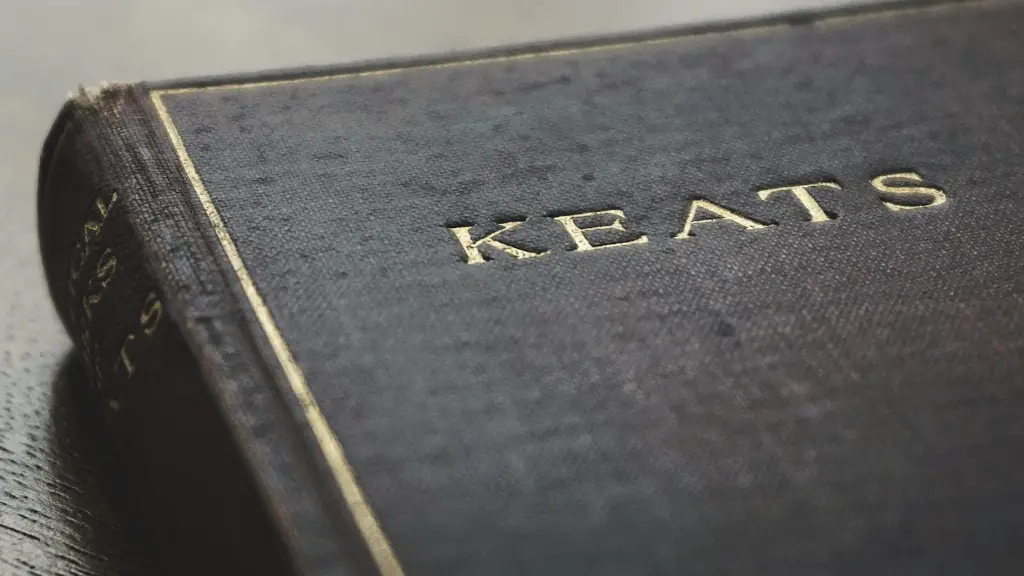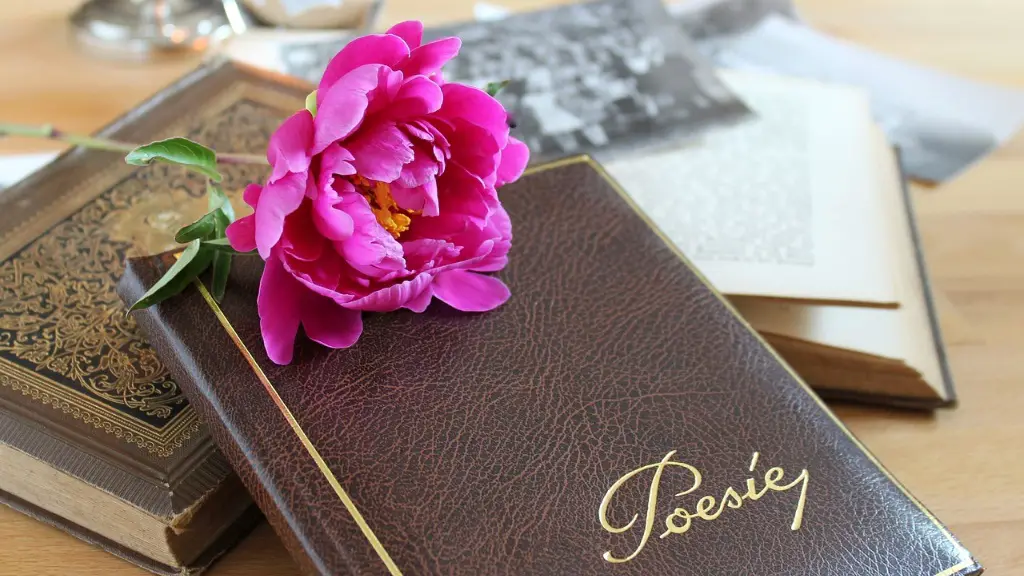Walt Whitman was an American poet, essayist and journalist, widely revered in both the United States and abroad. His seminal work, Leaves of Grass, which was first published in the 1850s, has become one of the most influential collections of poetry ever written. But what made Whitman famous, and how did he become such a respected figure in literature?
Whitman was a man of many talents. His enormous presence in the literary world stemmed from his unique ability to combine complex ideas and freeing poetic language. In Leaves of Grass, Whitman introduced a new style of poetry, combining Romantic tropes with the use of catalogues and cataloguing. His cataloguing method allowed him to list objects and people in a manner that had not been done before, this revolutionary technique made it easier for readers to comprehend and appreciate the humor in his work.
Whitman was born in Long Island, New York. His family were Quakers and he was raised in reactionary religion and culture. Walt’s collection of poems, Leaves of Grass, reflects his quakerhood in many aspects. For example, Whitman used language that was more accessible than the traditional English of his time, allowing readers to understand his work more easily. Additionally, Whitman’s free-form style of writing often used unique grammar and structure, something that was virtually unheard of in literature at the time.
But the most influential aspect of Whitman’s work was the use of words to craft a narrative that spoke to people of all cultures, genders, religions, and creeds. Whitman strove to incorporate themes of democracy, freedom and equality into his work, reminding readers of the growing cultural and political divide in the United States. This groundbreaking type of poetry allowed Whitman to be the voice of the people during a highly divided era in American history.
But the most crucial element of Whitman’s renown is his literary influence. Whitman’s poems have been interpreted by writers and scholars from all over the world, and he has been largely credited as an influence in modern poetry. Many of Whitman’s best known works, such as “Song of Myself” and “I Hear America Singing”, have been studied and celebrated for their layered meanings. Whitman’s poetic style, writing techniques, and themes have all left a legacy within literature which is still alive today.
Symbolism
Walt whitman wasn’t afraid to use creative methods to communicate a message to the reader. He made great use of symbolism and extended metaphors in his work. Many of his poems contain hidden meaning, something the reader can discover after careful analysis. Whitman was a master wordsmith and was able to carefully craft one phrase and draw out multiple meanings from it, depending on how the reader views the symbol or metaphor.
Whitman was also well known for his use of personification. Specifically, he would assign human traits and emotions to inanimate objects and everyday objects, such as a tree or a stone. By doing this, Whitman was able to convey his feelings to the reader. This was something that was quite unique at the time, and added a dimension to poetry that was not seen before.
Whitman’s use of symbolism, metaphor, and personification often helped him to explore issues of identity, connection and belonging. Through these literary devices, Whitman was able to blur the lines between self and others, often creating a sense of unity among humanity as a whole.
As a poet, Walt Whitman was not afraid to push boundaries and venture into unfamiliar territory with his writing. Indeed, his use of symbolism, extended metaphors, and personification made his writing some of the most memorable and timeless pieces of literature in human history.
Social Impact
Whitman was incredibly prolific and was a vocal advocate for democratic and progressive beliefs. His work was well regarded by the literary community of his time, but what really cemented his status as a well-respected poet was the impact his words had on the American public.
Leaves of Grass and his other works, including “Song of Myself” and “I Hear America Singing”, addressed issues of race, gender, and class in a time where these concepts were often taboo. Whitman challenged the notion of an accepted belief system in the United States, highlighting the need for progressive values and a fairer society.
Whitman was a vocal supporter of the abolitionist movement, and he used his poetry to express his outrage and disappointment at the injustice of slavery in America. Many of his works spoke of the beauty of equality, and implored his readers to fight for justice and unity.
Moreover, Whitman was a staunch supporter of voting rights for women. This issue was especially important to him due to his own mother’s experiences as an oppressed women in America. He used the power of his words to bring the issue to light, and was unashamed to speak up for the freedom of women in the United States.
Whitman’s social impact extended beyond the realm of poetry. He used his writing as a vehicle for expressing his views on the state of American society, and inspiring his readers to take action. His words were a catalyst for change, and his role in the culture of literature led to a new kind of poetry that celebrated freedom and justice for all.
Modern Legacy
Whitman’s works continue to inspire literature and art to this day. From renowned authors such as James Baldwin and Toni Morrison citing him as an influence in their writing, to modern day poets using his style to create their own works, Whitman’s legacy is still felt in the literary world.
In addition to this, Whitman’s legacy lives on in many places around the United States. In his native state of New York, many statues of the poet exist and there has even been a Walt Whitman bridge in Brooklyn. Numerous educational institutions have also been named in his honour, and his works continue to be revered by scholars and students alike.
Finally, Whitman’s work remains foundational to the development of literature. His modernizing of traditional poetic forms and styles changed the landscape of American poetry and his work continues to pave the way for future generations of poets who dare to push boundaries and create works that are meaningful, thought-provoking and memorable.
Reception
During Whitman’s lifetime, his works were met with a range of reactions. Those who understood and appreciated the power of his writing welcomed his words with open arms, while those who felt threatened by the progressive ideas and values he espoused offered fierce criticism. Despite this, Whitman’s work has continued to gain acclaim in the century since his death.
Posthumously, Whitman’s poems have been studied, praised, and critiqued by a range of scholars, writers, and general readers. His work is part of a continuing critical discourse that examines the enduring power of language to shape individual lives, cultures and nations. To this day, Whitman’s work remains integral to the development of American literature and is still considered one of the most influential poets of all time.
Achievements
Whitman’s work cemented him as a renowned figure in literature and his legacy continues to live on. In addition to founding a new style of poetry, Whitman was proud to contribute to the ongoing social dialogue at the time. He encouraged his readers to think critically, to open their eyes to free the disadvantaged and unite all people in the face of oppression.
In recognition of his works, Whitman received literary accolades from prestigious organizations across the world. While some honours went to him anonymously (he was invited to attend the Paris Exposition but never accepted the invitation), others such as the Oscar Wilde Prize and the Pulitzer Prize have his name attributed to them.
Further, he remains an important figure in the history of literature, not just for his writing, but for the entire cultural impact he has made. He has been a source of inspiration for those fortunate enough to stumble upon his works, and he continues to be read and appreciated by millions of readers across the globe.
Relationships
Whitman had a close relationship with his family, particularly his younger brother, George. As a young adult, he held a close bond with his brothers, often attending family dances together. His brother George even went as far as to design a new body of Leaves of Grass when Whitman published a new edition in the mid-1860s.
Whitman did not have many close friendships, but he did have notable connections to some of the great minds of the time. He regularly corresponded with renowned personalities of the era, including William Dean Howell, Oliver Wendell Holmes and Ralph Waldo Emerson. His letters with Emerson reveal the strong bond between the two men, and reciprocate their shared enthusiasm for philosophy, politics and nature.
Whitman was also well known for his passionate relations with women. He was not afraid to reveal his emotions in the presence of other women and often wrote about his love of female companionship. His dalliances tended to be more physical than emotional, but his willingness to engage with women and express his desires is testament to the progressive views he held even during a period when such actions were frowned upon.
Whitman was an incredibly open-minded individual, who believed in the power of connectivity and relationships. His relationships with women, men and family alike are evidence of his dedication to building meaningful connections with those around him.





